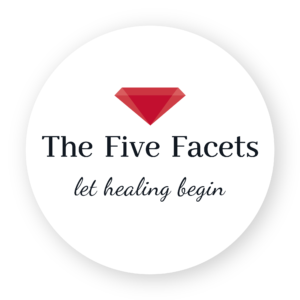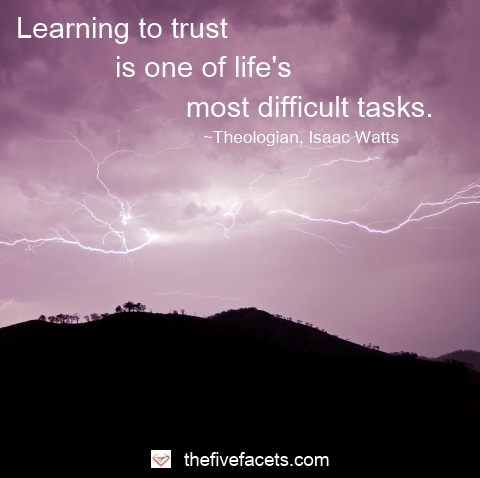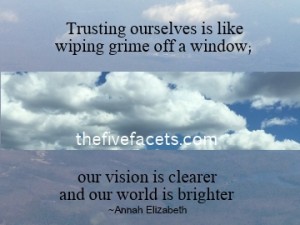“Learning to trust is one of life’s most difficult tasks.” ~Seventeenth-century theologian Isaac Watts
Trust. What is it? What does it mean? What does it accomplish?
This five-letter word is like a second cousin to another five-letter word–Truth.
Trust is basically having faith or a steadfast belief in the people, places, and planet around us. It’s a sense that these things will be reliable and honest. In other words, we can count on them to be there for us in whatever capacity we might need.
The Trusted will protect us when we’re afraid, buoy us when we need lifting, comfort us when we’re sad, rejoice with us when we’re joyful, and basically “have our backs.”
For a little five letter word, that right there’s a taller order than the enormous stack of pancakes my grandpa used to talk about.
Clarity Connects speaker Nichole Eaton spoke about trust and told the story of a team bonding exercise where participants were asked to fall backwards off a picnic table into the arms of their classmates.
The word trust evokes a broad host of feelings and thoughts for most of us.
When I talked to Counselor Ess about the idea of this teamwork challenge, I discovered that the thought of free falling evokes fear for me. Fear that lies deep in my belly’s bosom.
Further reflection revealed that I’m not afraid of hitting the ground because I know what’s going to happen when I land. It’s going to hurt.
What I am afraid of is the unknown, all those things that can happen during the space between that initial leap and the eventual landing.
It’s sort of like this: Will I get smacked in the eyes and blinded by flying bird poop? Will those air companions see me as friend or will they perceive me as foe and begin trying to peck my eyes out? If others took the leap with me and ran into problems with the chute, will I be able to save them?
The last thought begins to get to the root of one of my anxieties: How will my actions and abilities affect those around me?
Do I have what it takes? (aka Am I as good as the gal next door?) What if I fail? (aka How many people am I going to let down?) What if I let someone down? (aka What will others think of me?) Will I somehow cause more harm than good? (aka I want to be helpful, not harmful; I want to inspire, not inhibit; I want heal, not hurt...)
Can you imagine how all THAT comes from the topic of falling backwards off a picnic table?
All of these conflicted emotions are derived from or focused on what is outside of me. For me, they are also directly linked to my Social Facet, which is at the top of my facets hierarchy.
We often associate and attribute trust with people, places, and perceptions that are outside of us.
Trust the universe. Don’t trust a liar/cheater. In God we trust. I don’t trust her as far as I can throw her.
Let’s face it, these are very real circumstances. When we feel manipulated, betrayed, abandoned, embarrassed, or judged our trust is often diminished or demolished.
When we face repeated heartaches and uncertainty in our relationships, we begin to distrust the world around us, which is a stark contrast to the unadulterated form in which we enter this world.
When mishap or mayhem happen, many of us will desire to one day reach a place of acceptance, one where we are able to identify with some version of that hackneyed phrase”Everything happens for a reason.” In essence, we ultimately want to trust that the Universe/God/Creator is allowing/enabling certain events to help us in our personal growth.
Which leads me to the second side of trust: Trust in Self.
All too often when we are complaining about or running from the outside world that we feel we can’t trust, we are actually dealing with a lack of inner trust.
In other words, what we could be facing is a simple fact that we don’t trust ourselves to make the right choices, to have a strong enough voice, to trust that we are no different than anyone else, or to trust that we are as worthy as the guy or gal next door.
Do I have what it takes? is colored with I’m not capable or I’ve failed so many times. What if I fail? is colored by I’m a failure or I’ll never get anything right. What if I let someone down? is tinged with I’m a bad person.
All of these thoughts and insecurities are driven by embarrassment, judgement, guilt, and shame. At the root of all of these emotions is a lack of trust in our self.
We lack the understanding and confidence that we are worthy just the way we are.
When I remember that, I am at peace with myself and with my outside world.
We forget or don’t acknowledge that everyone makes mistakes and that our greatest strengths come from our missteps.
We forget or simply don’t know that we are NOT the sum of our misgivings.
We humans are the sum of our failures and successes, our experiences, our growth, and the grace that comes from those events.
We forget or simply don’t know that we are enough, just the way we are.
When I remember that, I am more at peace with myself and with my outside world.
All of us, Journeyer. You, Me, and all of our neighbors. We are enough. Just the way we are.
That inner trust is often a learned behavior, a lack of which continues to manifest itself in different areas of our lives until such time that we are able to change our thinking.
Inner trust comes from a place of confidence, one that achieves approval through personalized constrictive criticism and reflection. Inner trust flows from a place of healing and love.
Can we have inner trust and not trust the external happenings around us? Absolutely.
We can trust in ourselves and be leery of others who haven’t been reliable or honest or who haven’t had our backs.
What’s important is for us to be able to recognize those little inner voices that might be contributing to or complicating our trust in what is outside of us.
Likewise, it’s equally important for us to recognize when those outer voices of the people around us are causing us to engage in self condemnation and doubt.
[Tweet theme=”basic-white”]Trusting ourselves is like wiping grime off a window; our vision is clearer and our world is brighter.[/Tweet]How has an inner or outward trust impacted your life? I love your stories and wisdom! Share something?




2 Comments on “Healing and the Two Sides of Trust”
It’s really hard to trust again when you’ve done a real life trust fall – and been let down by those you trusted the most. But I can (happily) say it can be done. Always happy to see your posts Annah. They uplift me. I’d fall of a picnic table if you were behind me any day.
Thank you, Liv. Ditto. It’s a date. A picnic table and a long overdue face-to-face! <3